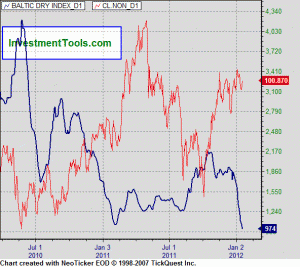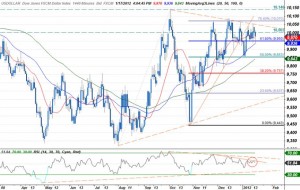I want to show you a couple of things I’m looking at.
Firstly, the Baltic Dry Index versus the price of oil:

(Image from investmenttools.com)
A bit of background; the BDI has been plunging as represented by the cost people are willing to pay globally to ship goods to other parts of the world. This coincides with a drop in global demand as represented by worldwide manufacturing.
I’m hearing the voices trying to dismiss the BDI as a poor indicator; the BDI like basically every other type transaction, determines price on the margin, which is to say very small net imbalances relative to the gross numbers coincide with disproportionately large price swings (a small shortage causes prices to skyrocket and a small amount of excess can collapse them). Okay, well then you’ll have to dismiss more or less every other indicator also, because that’s how trade works.
I could agree that the BDI is off mark if it weren’t that it is coinciding with other ominous signs. Firstly, as I’ve already displayed with the image above, is that oil and fuel prices are increasing. If energy prices were increasing because of demand, then wouldn’t the BDI be increasing alongside them? Secondly, look at the collapse of rail traffic that occurred last month. The third is the strengthening U.S. dollar, and the weakening euro, which really together powerful sway global trade.
So why is the BDI dropping like this? I admit it could be that the prices of basic materials have been dropping, and so raw material producers are demanding a subsequent decrease in shipping margins. This is the most sanguine outcome. Dollar strength, in and of itself, is causing lower good prices forcing concession on the part of shippers, but that strength is only redirecting trade flows and net transactions are actually stable.

(Image from Yahoo)
However, because of the magnitude which input costs like fuel affect the room for prices to move, I am inclined to believe that a bigger reason is that, globally, demand for goods is slowing down.
Now more directly to our situation here in the U.S.: our GDP is probably about $15 trillion, give or take. Meanwhile, thanks to a cheaper dollar up until mid-2011, our exports were booming and our imports were stabilized, resulting in some steady reductions of our trade deficit…until recently. Our exports according to World Bank numbers, as of 2010, were 13% of GDP; so how much directly would exports have to collapse, by themselves, to utterly abolish any hopes of the U.S. growing?
The answer is about 20%. That reduction would more than suffice to send U.S. growth screaming to zero.
But in actuality, the amount needed is less. Reduction in exports also causes U.S. unemployment which will directly harm U.S. domestic spending. How badly does it skew? Well it’s impossible to lock down for sure, but understanding how consumer participation in networking works, if our trade deficit starts to blow out because of exports collapsing, then the U.S. economy could see a multiple of those base numbers; maybe 2:1, maybe much more. So really a reduction of U.S. exports by 7-10% would definitely be more than sufficient to crush U.S. growth.
And the worst part is, the Fed would be nearly powerless to fix such a problem in the current environment.
It’s tempting to fall on the old crutch; well Bernanke will just devalue the dollar improving U.S. exports.
Will he now?
But at $100 a barrel, oil is already straining the margins of business profits considerable, slowing the flow of currency, and any act of easing would cause oil prices to go higher, not lower. What would that do to the economy? It is unfortunate, but at some point, dollar devaluation is incapable of being absorbed by the population, and reality materializes anyway…plus additional consequences. Do not overlook the fate of the nations of history, who dared to believe that printing money was some catchall. I couldn’t tell you if this next round of expected printing would actually fail; all I can say for sure is that, where we are now, printing is a wild card with uncertain ends.
If basic demand is really inverse to price, then Bernanke cannot increase exports without creating a counter effect on domestic consumption and production. And besides, it’s not like devaluing the monetary supply to increase exports is some great secret of the 21st century. Every other country on Earth could use the extra cash flow, so why do you think a Bernanke print job would not be simultaneously met by all the emerging markets of the world?
Now, the latest report from November shows net exports shrinking about 1%. Another 6 months of that and I’d bet all U.S. growth is gone. However, the potential for a shakedown of exports is much worse than that. Remember, the greatest growing export of the U.S. is actually fuel.
How much fuel do you think Europe is going to need, if they keep shrinking? Ditto for emerging markets, given the precarious state of their biggest buyer?
Actually, the decline of our exports could accelerate based on the developments in Europe. And if fuel costs begin to fall dramatically in fashion, then our exports could be hit by a third force of momentum.
So, based on the latest trade reports, I’d guess we’re about one quarter of the business cycle away before hope that the U.S. somehow mystically leaves the rest of the planet behind is extinguished in a plume of disappointment. And the worst part is I don’t think Europe or other markets are going to greatly benefit from our stronger currency because the disappointment from the U.S. letdown will very likely temper purchases of imports. Not to mention that their problems are so extensive, continued austerity and reservation will overpower whatever slight benefit they gain in trade pricing.
In conclusion, dollar strength is persisting because of investors looking for safe havens, a weak economy in foreign trade partners, and a broad drop in most basic materials – energy notwithstanding. This, and the plunging demand abroad plus softening demand at home, is causing the Baltic Dry Index to plummet; which is very likely a good indicator of the direction which economies and markets are headed right now, rather than some sort of false signal. I expect the dollar to continue to gain against other currencies going forward, further decrease in demand globally, a discontinuation for the expectation of growth in the U.S. and most other nations, and eventually a run lower in markets for both equities and commodities as people finally acknowledge these developments and adjust to them.
Comments »


